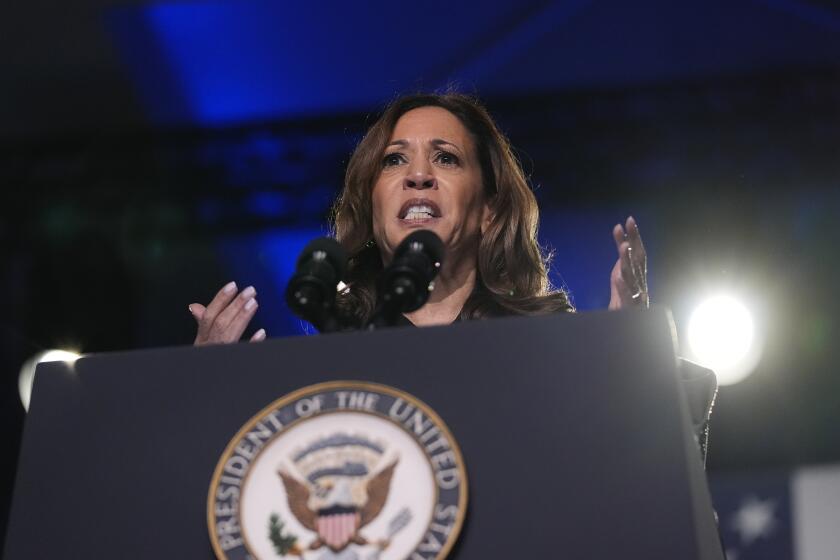British leader gives BP a boost
Helped by supportive comments from the new British prime minister and a rally in the broad stock market, shares of beleaguered oil giant BP surged Thursday to their biggest gain since the crisis over the Gulf of Mexico oil spill erupted in April.
BP’s stock jumped more than 12% as British Prime Minister David Cameron said he would discuss BP in a scheduled telephone call with President Obama this weekend.
Investors interpreted that as an effort by the British government to counter-balance the increasingly vitriolic criticism that Obama and other U.S. lawmakers have leveled at the London company in recent days.
Cameron’s comments came amid rising concern in Britain that BP might be forced to eliminate its stock dividend, which is a huge source of income for pensioners at a time when the government also is warning of severe fiscal cutbacks.
BP shares jumped $3.58, or 12.3%, to $32.78 as part of a broad rally that carried the Dow Jones industrial average up 273 points. Still, the stock remains deeply depressed, and the rally was partly a bounce back from a nearly 16% decline the previous day.
BP has lost nearly half its market value since the April 20 explosion of the Deepwater Horizon, a drilling rig operated by Houston-based Transocean on BP’s behalf. Eleven workers died, and oil spewing from the well has fouled gulf waters, killed wildlife and stained beaches.
The latest round of panic selling “was triggered by White House comments, which we think were both inappropriate and unenforceable in a court of law,” analyst Fadel Gheit of Oppenheimer & Co. wrote in a note to clients. “Investors had dumped BP shares on fear of unrealistically high potential liabilities.”
Speculation has swirled on Wall Street that BP might seek bankruptcy protection in the face of mounting cleanup costs or that it might seek to unload assets to pay bills.
BP on Thursday reiterated that the company is financially resilient, which “gives us significant capacity and flexibility in dealing with the cost of responding to the incident, the environmental remediation and the payment of legitimate claims.”
U.S. Sens. Charles E. Schumer (D-N.Y.) and Ron Wyden (D-Ore.) called for BP to suspend dividend payments this week.
“We find it unfathomable that BP would pay out a dividend to shareholders before the total cost of BP’s oil spill cleanup is estimated,” they wrote in a strongly worded letter to Tony Hayward, BP’s chief executive.
That has sparked an avalanche of concern in Britain. BP probably accounts for more than 10% of the major dividend income in pension funds, said fund manager Justin Urquhart Stewart of Seven Investment Management.
“Pensioners rely upon not just shares going up.... What they want is good regular dividend income flow,” Urquhart Stewart said.
During a conference call with investors and analysts last week, Hayward and BP Chairman Carl-Henric Svanberg made no specific dividend payout promises but pledged to meet their obligations to shareholders.
Financial observers such as Deborah Hyde, writing on the financial website Citywire, interpreted the comments as a cautious response to U.S. demands.
The board was clearly “not wanting to anger U.S. politicians by promising to hand cash over to shareholders too soon but seeking to reassure investors that the group’s financial position was sound,” she wrote.
Some analysts doubted that the British government’s effort would have a lasting effect.
“The British government backing certainly doesn’t hurt, but there’s a lot that it doesn’t affect,” said Phil Weiss of Argus Research. “It won’t affect the moratorium on drilling, which may go on a lot longer than we once believed, and that would hurt BP a lot.”
The Obama administration’s temporary moratorium on most deep-water drilling in the gulf, instituted in the wake of the BP spill, is costing jobs, Louisiana politicians have complained in recent days.
If the six-month moratorium is extended, it could reduce U.S. energy output by as much as 300,000 barrels a day by 2015, the International Energy Agency warned Thursday.
The oil spill “might also prove to be a supply-side game changer,” the Paris-based energy watchdog for industrialized nations said in its monthly report on energy supply and demand. “It is unquestionably a human tragedy and a major blow to the ecosystem and local economy in the U.S. gulf. Whether it ultimately turns out to be a defining moment for broader U.S. energy policy and for offshore oil and gas development worldwide remains to be seen.”
Janet Stobart is a special correspondent in London.
More to Read
Sign up for Essential California
The most important California stories and recommendations in your inbox every morning.
You may occasionally receive promotional content from the Los Angeles Times.











